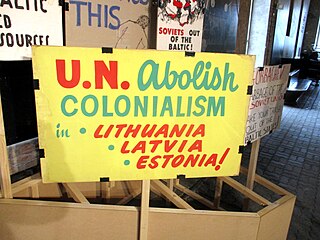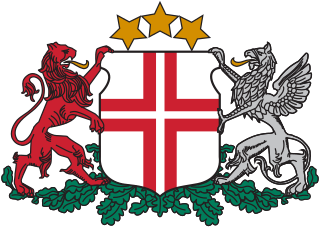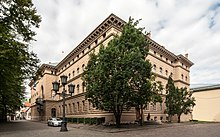
Latvia, officially the Republic of Latvia, is a country in the Baltic region of Northern Europe. It is one of the three Baltic states, along with Estonia to the north and Lithuania to the south. It borders Russia to the east and Belarus to the southeast, and shares a maritime border with Sweden to the west. Latvia covers an area of 64,589 km2 (24,938 sq mi), with a population of 1.9 million. The country has a temperate seasonal climate. Its capital and largest city is Riga. Latvians, who are the titular nation and comprise 63.0% of the country's population, belong to the ethnolinguistic group of the Balts and speak Latvian. Russians are the most prominent minority in the country, at almost a quarter of the population; 37.7% of the population speak Russian as their native tongue.

The occupation of the Baltic states was a period of annexation of Estonia, Latvia and Lithuania by the Soviet Union from 1940 until its dissolution in 1991. For a brief period, Nazi Germany occupied the Baltic states after it invaded the Soviet Union in 1941.

University of Latvia is a public research university located in Riga, Latvia. The university was established in 1919.

Civil law is a legal system rooted in the Roman Empire and was comprehensively codified and disseminated starting in the 19th century, most notably with France's Napoleonic Code (1804) and Germany's Bürgerliches Gesetzbuch (1900). Unlike common law systems, which rely heavily on judicial precedent, civil law systems are characterized by their reliance on legal codes that function as the primary source of law. Today, civil law is the world's most common legal system, practiced in about 150 countries.
The Law of the People's Republic of China, officially referred to as the socialist rule of law with Chinese characteristics, is the legal regime of China, with the separate legal traditions and systems of mainland China, Hong Kong, and Macau.

Public intoxication, also known as "drunk and disorderly" and "drunk in public", is a summary offense in certain countries related to public cases or displays of drunkenness. Public intoxication laws vary widely by jurisdiction, but usually require an obvious display of intoxicated incompetence or behavior which disrupts public order before the charge is levied.
Latvia has recognised same-sex civil unions since 1 July 2024. On 9 November 2023, the Saeima passed legislation establishing civil unions conferring similar rights and obligations as marriage with the exception of adoption and inheritance rights. The bill was signed into law by President Edgars Rinkēvičs in January 2024, and took effect on 1 July 2024. This followed a ruling from the Constitutional Court of Latvia on 12 November 2020 that the Latvian Constitution entitles same-sex couples to receive the same benefits and protections afforded by Latvian law to married opposite-sex couples. However, the Constitution has also prohibited the recognition of same-sex marriage since 2006.
Lithuanian law is a part of the legal system of Lithuania. It belongs to the civil law legal system, as opposed to the common law legal system. The legal system of Lithuania is based on epitomes of the French and German systems. The Lithuanian legal system is grounded on the principles laid out in the Constitution of the Republic of Lithuania and safeguarded by the Constitutional Court of the Republic of Lithuania.

The Constitution of Latvia is the fundamental law of the Republic of Latvia. Satversme is the oldest Eastern or Central European constitution still in force and the sixth oldest still-functioning republican basic law in the world. It was adopted, as it states itself in the text, by the people of Latvia, as represented in the Constitutional Assembly of Latvia, on 15 February 1922 and came into force on 7 November 1922. It was heavily influenced by Germany's Weimar Constitution and the Swiss Federal Constitution. The constitution establishes the main bodies of government ; it consists of 116 articles arranged in eight chapters.
Kristine Jarinovska is legal scientist, doctor of juridical science, legal scholar, sworn advocate, attorney at law, historian and was the Secretary of State of Ministry of Education and Science of the Republic of Latvia, leading researcher of the University of Latvia.

The three Baltic countries, or the Baltic states – Estonia, Latvia, and Lithuania – are held to have continued as independent states under international law while under Soviet occupation from 1940 to 1991, as well as during the German occupation in 1941–1944/1945. The prevailing opinion accepts the Baltic thesis that the Soviet occupation was illegal, and all actions of the Soviet Union related to the occupation are regarded as contrary to international law in general and to the bilateral treaties between the USSR and the three Baltic countries in particular.

The Declaration "On the Restoration of Independence of the Republic of Latvia" was adopted on 4 May 1990 by the Supreme Soviet of the Latvian SSR in which Latvia declared independence from the Soviet Union. The Declaration stated that, although Latvia had de facto lost its independence in 1940, when it was annexed by the Soviet Union, the country had de jure remained a sovereign country as the annexation had been unconstitutional and against the will of the Latvian people.

The judicial branch, organized under the constitution and organic law, is one of five organs of state power elected by the National People's Congress (NPC), in the People's Republic of China. China does not have judicial independence or judicial review as the courts do not have authority beyond what is granted to them by the NPC under a system of unified power. The Chinese Communist Party's Central Political and Legal Affairs Commission maintains effective control over the court system and its personnel. Hong Kong and Macau have separate court systems in accordance with the "one country, two systems" doctrine.

The president of Latvia is head of state and commander-in-chief of the National Armed Forces of the Republic of Latvia.

Latvian Naval Forces is the naval warfare branch of the National Armed Forces. It is tasked with conducting military, search and rescue operations, mine and explosive sweeping on the Baltic Sea, as well as ecological monitoring activities. The Naval Forces have participated in international NATO/Partnership for Peace operations and various exercises with great success. The main development priorities of the Naval Forces are to expand their activities within the Baltic States’ Ship Squadron BALTRON and to develop a Sea Surveillance System. They pay a great deal of attention to professionally specialized training and English-language teaching.

Lesbian, gay, bisexual, and transgender (LGBT) persons in the post-Soviet states face legal challenges not experienced by non-LGBTQ residents.
Rank comparison chart of all armies of Post-Soviet states.
Rank comparison chart of all navies of Post-Soviet states.
Rank comparison chart of enlisted for all armies of Post-Soviet states.












